The UAE appeals on many levels: it offers access to MENA markets, top-tier infrastructure, and a regulatory environment that favors global growth. With expats constituting over 88% of the country's population, it’s no wonder international talent and businesses flock there.
But the question for businesses expanding into this market remains: speed market entry with an Employer of Record (EOR) or invest in a local legal entity for longer-term presence?
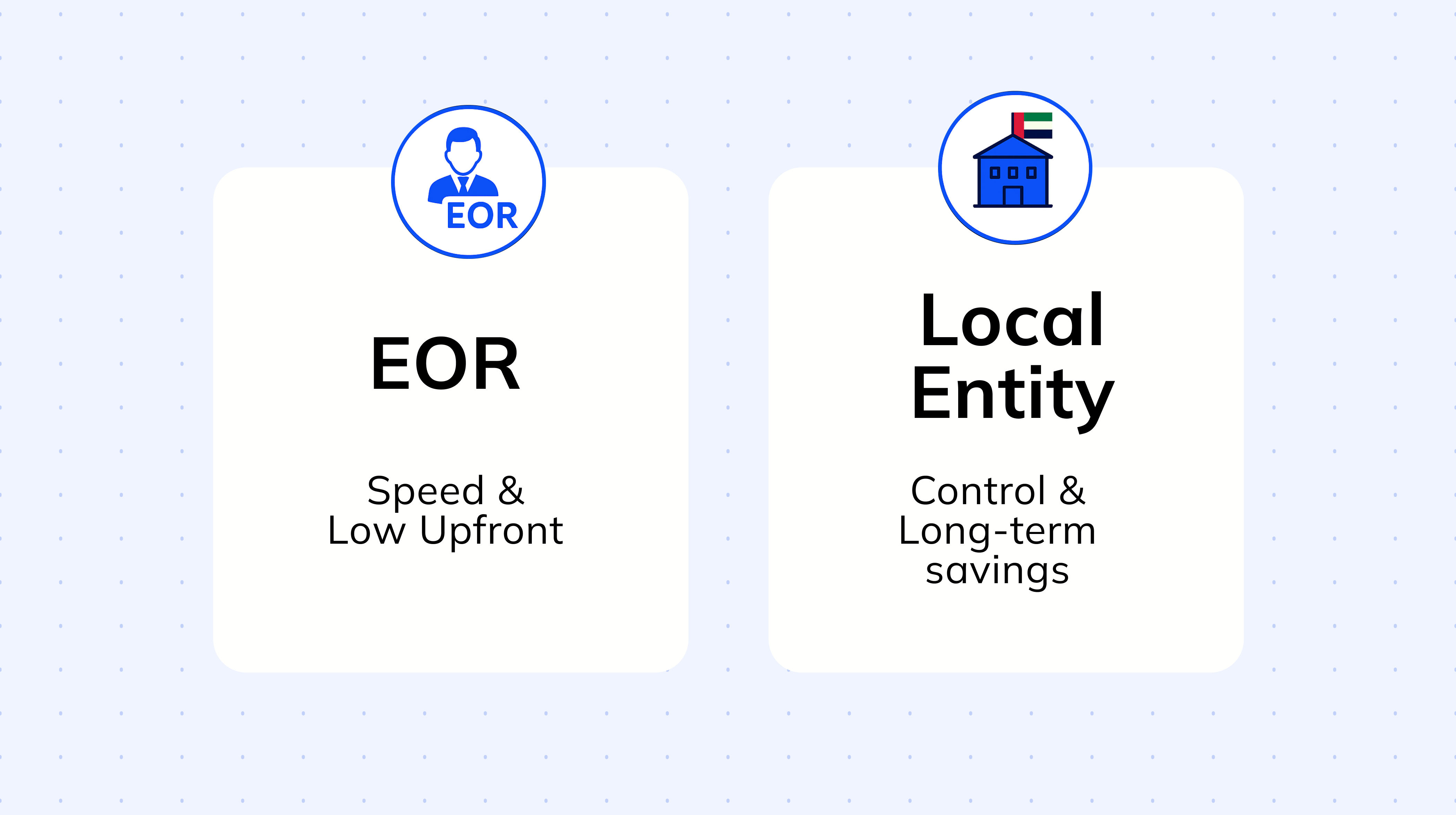
That decision shapes your timeline, costs, compliance risk, and strategic options. Below, we lay out both models with real cost figures, expert perspectives, and practical scenarios so you can pick the path that best fits your growth plans.
First, What is the Employer of Record (EOR) Model?
An Employer of Record lets you tap into the UAE market fast with no local company setup required. Once you initiate the model, EOR becomes the official employer, handling payroll, contracts, visa sponsorship, medical checks, health insurance, and end-of-service gratuity while you stay in charge of daily operations.
Key Benefits of EOR for UAE Expansion
Speed & Agility: EOR providers typically onboard employees in 10–15 business days, leveraging existing visa quotas and established local infrastructure. You’ll be operational in weeks, not months.
Reduced Risk & Compliance: EORs manage evolving regulations—everything from visa rules to Emiratisation quotas (2% citizen hires for teams over 50, rising to 10% by 2026). They stay on top of labor-law changes so you don’t have to.
Cost Efficiency (Initial): Monthly fees typically range from $299 to $1,500 per employee. With RemotePass it’s $349. There’s no large upfront investment—just a clear, per-employee rate.
Flexibility: Market testing becomes seamless with EOR solutions. You can easily expand or downsize your workforce based on market response without the long-term commitments associated with local entity ownership.
Access to Talent: Hire the best people anywhere in the UAE without wrestling with complex visa processes or geographic limits.
Potential Drawbacks of EOR
Long-term Cost Considerations: Monthly fees add up as your team grows. If you plan to hire dozens of people indefinitely, setting up your own entity often becomes more cost-effective.
Limited Direct Control: Since you’re not the official employer, you may hit snags with local banks, certain business licenses, or big-ticket client contracts that demand a UAE-registered entity.
Brand Perception: Employees are technically employed by the EOR, not directly by your company, which might affect brand loyalty or employee identification with your organization during critical growth phases.
Setting Up a Local Company in the UAE
Forming your own UAE entity—whether a Free Zone company or a Mainland LLC—puts you in full control. You’ll own 100% of the business, manage payroll, HR and finance internally, and handle all legal compliance. This approach lets you offer the full range of services under UAE law and build a permanent brand presence. However, you’ll also need to navigate registration requirements, secure a physical office, and meet shareholder-ownership rules.
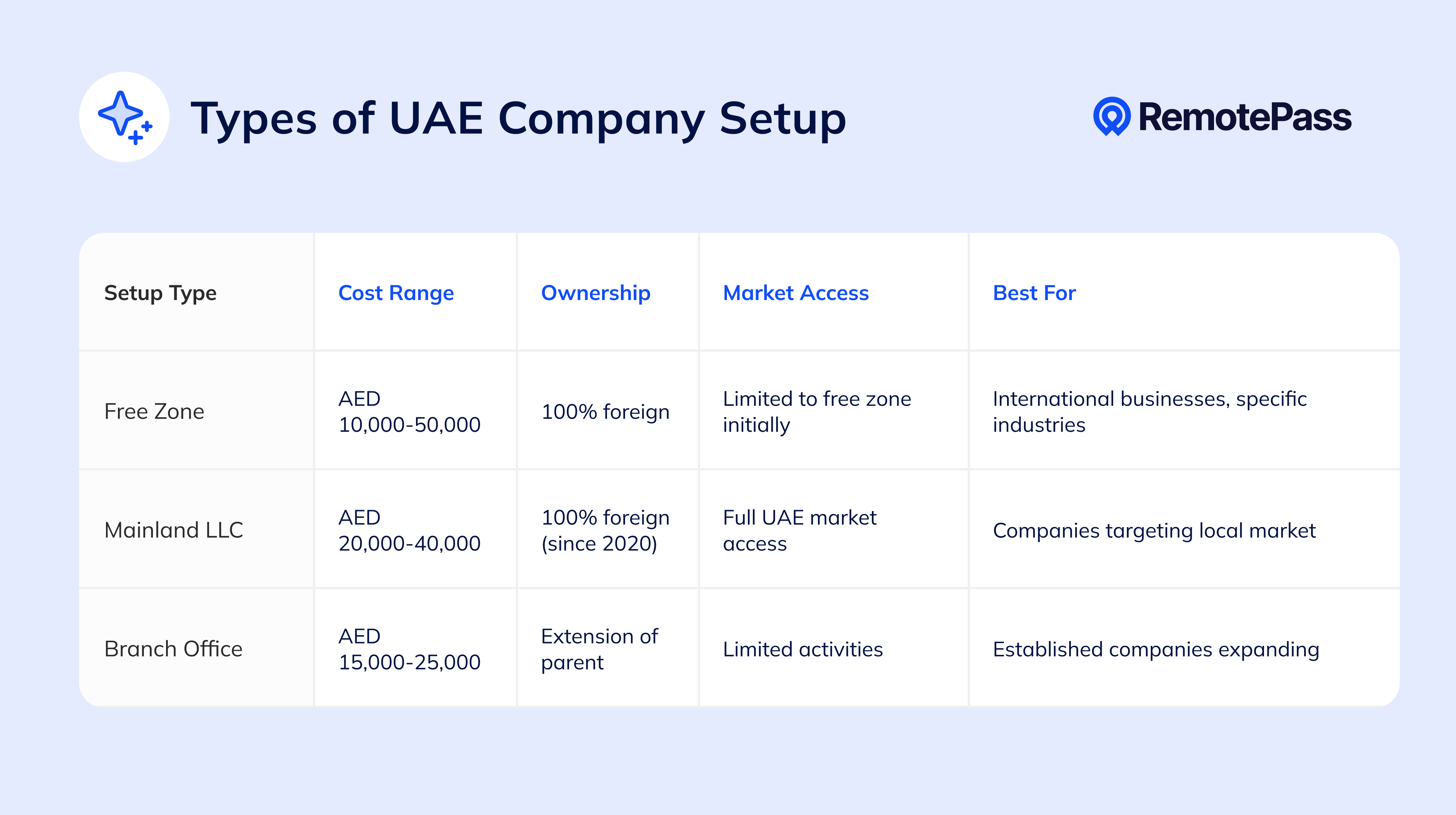
Key Benefits of Local Company Setup
Full Control & Brand Presence: You own the entity outright, so your team works directly for you. That clarity boosts employee loyalty and makes your brand more memorable to clients.
Long-Term Cost Efficiency: For larger, stable teams, local entity setup offers significant cost savings over time. While initial setup costs are substantial, per-employee operational costs typically become lower than EOR fees as your workforce grows beyond 10-15 employees over 2+ years.
Comprehensive Business Activities: You can invoice clients, hold assets, bid on government contracts, and form local partnerships—things an EOR can’t always offer.
Investor and Client Confidence: Local presence often carries more weight with UAE-based clients and potential investors. It demonstrates long-term commitment to the market and can open doors to opportunities requiring direct legal entity participation.
Potential Drawbacks of Local Company Setup
Time & Complexity: The setup process typically takes 1-3 months, involving multiple government agencies, licensing procedures, and regulatory approvals. This timeline can delay market entry significantly when speed is critical.
High Initial Investment: Beyond registration fees, you’ll cover:
- Trade license fees: AED 8,000+ annually
- Office rent: AED 30,000-150,000+ annually
- Visa processing: AED 4,000+ per employee
- Legal and administrative setup: AED 5,000-15,000
Full Compliance Burden: You become entirely responsible for UAE labor laws, tax rules, and pension (GPSSA) obligations. For Emirati employees in the private sector, contributions total 26% of the pensionable salary—15% employer and 11% employee. For salaries below AED 20,000, the government covers 2.5% of the employer’s share (so the employer effectively pays 12.5%). The pensionable salary cap for new private-sector joiners is AED 70,000 (AED 50,000 remains for earlier registrants).
Long-Term Commitment: Local entity setup represents a significant commitment that's difficult to reverse quickly. If market conditions change or business priorities shift, you'll face substantial exit costs and complex dissolution procedures.
Pro Tip: Engage experienced legal and financial advisors early in the process. Their guidance—especially around free-zone choice and compliance—can save you from expensive missteps.
EOR vs. Local Setup in UAE
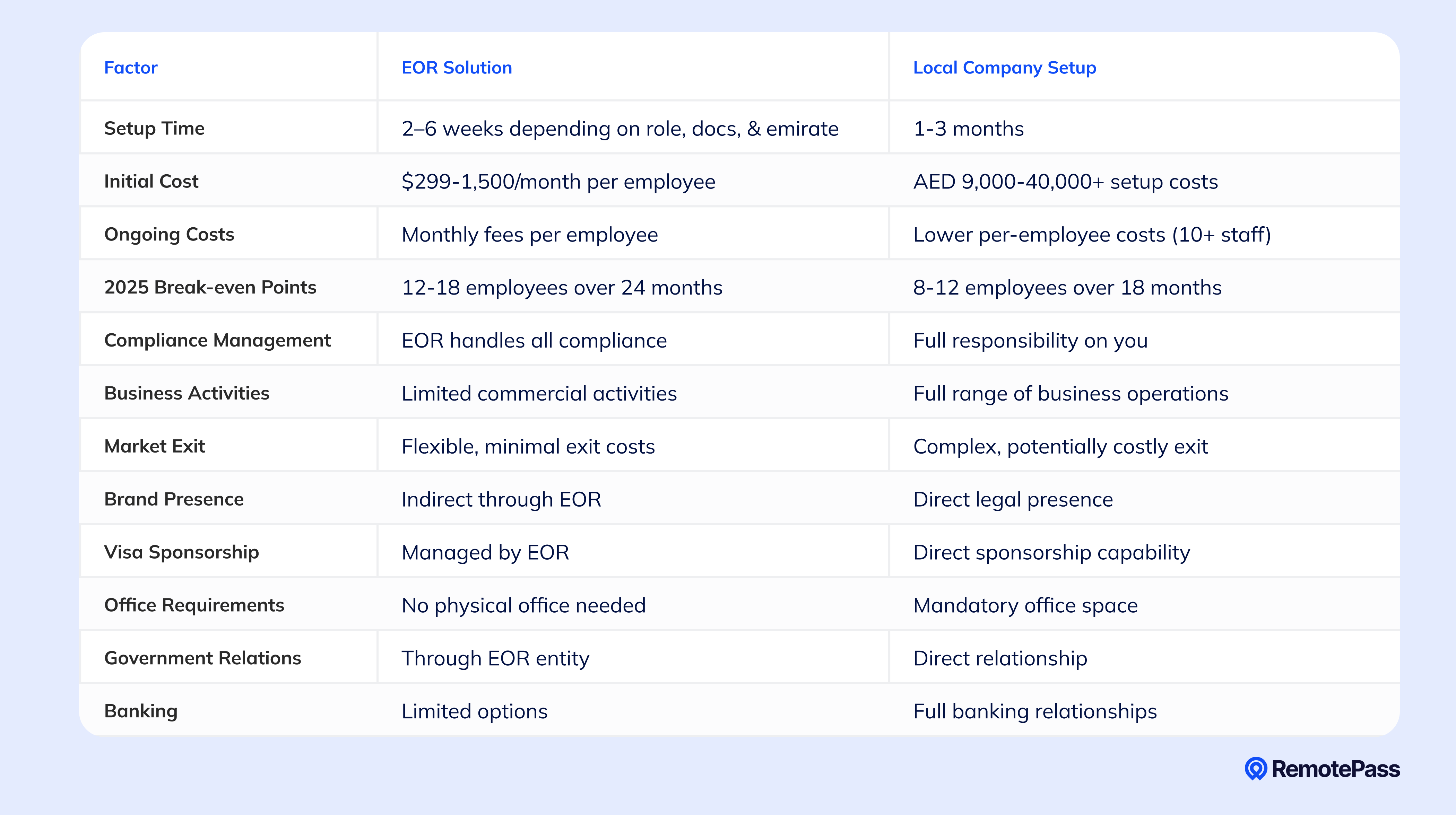
Cost Breakdown Analysis
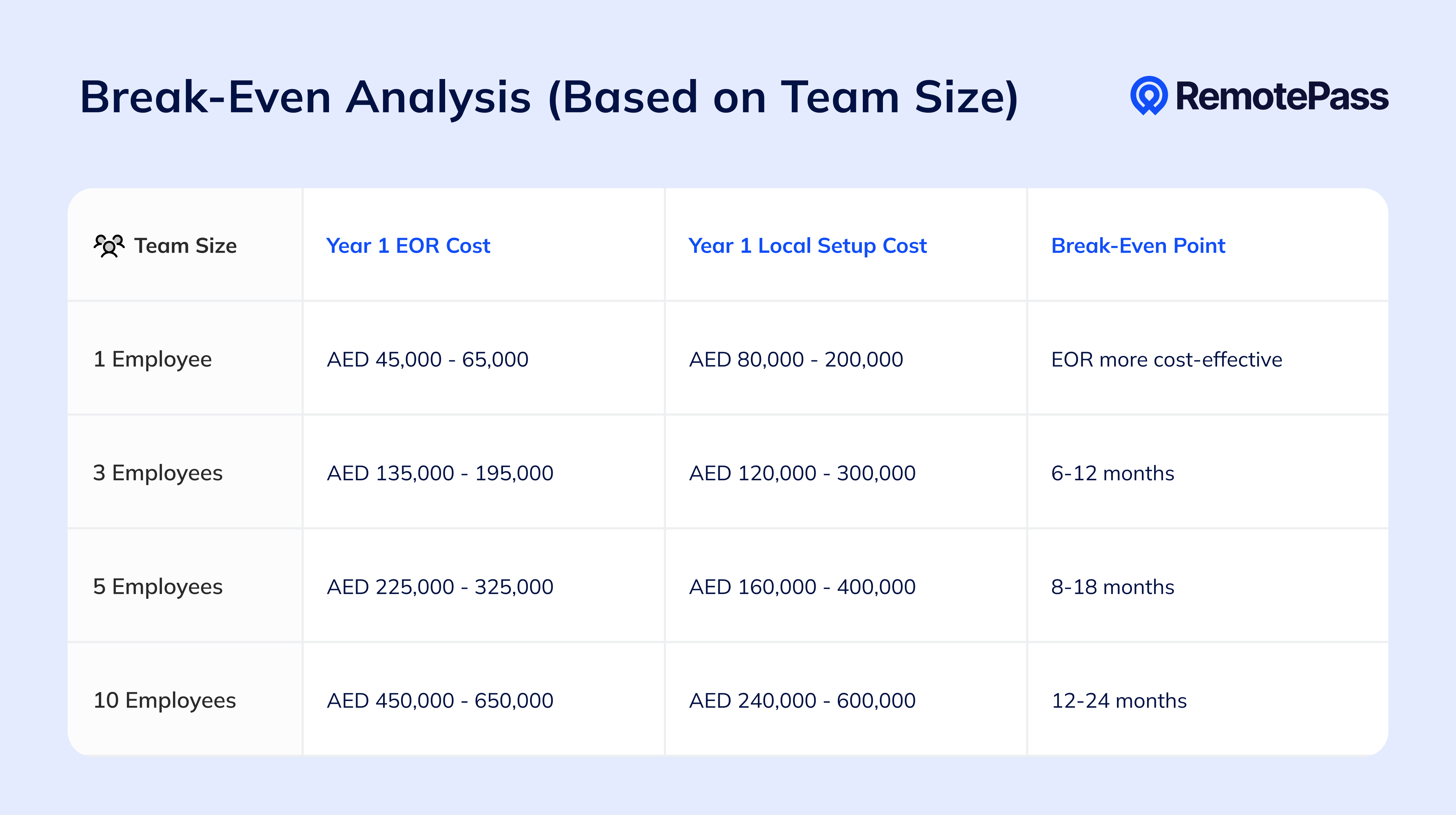
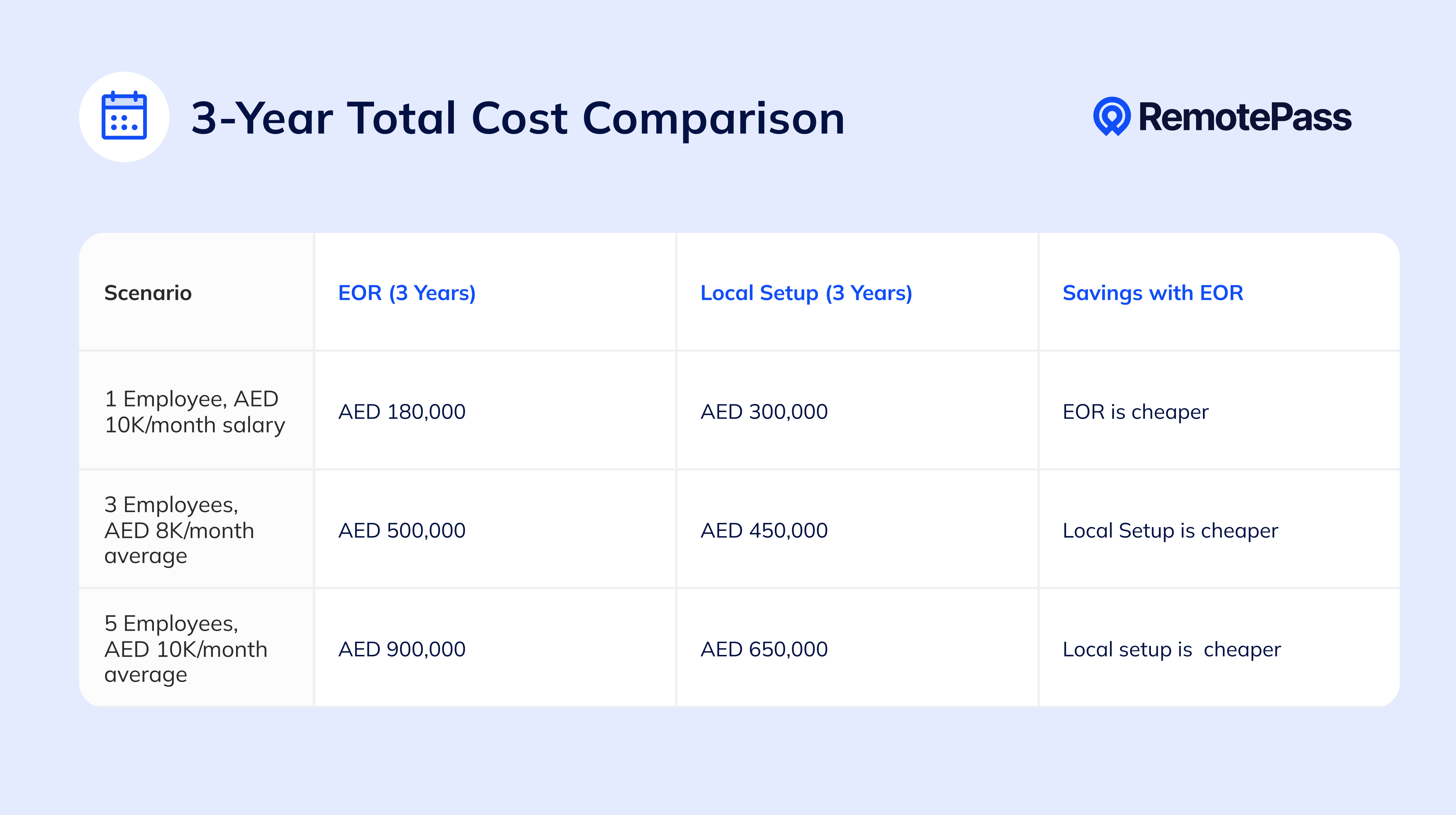
Use-Case Verdicts: When to Choose Which
Choose EOR if:
- Rapid Market Entry is Critical: Get staff in place in 2–3 weeks, not months, to seize immediate opportunities or quickly test demand.
- Your team is small: For teams of 1-10 employees, EOR solutions typically offer better cost efficiency and significantly reduced administrative burden.
- Your future is uncertain: If you’re validating the market or waiting on client wins, EOR lets you scale up or wind down without big exit fees.
- You’re not a UAE expert: Lean on the EOR’s deep knowledge of visas, labor law and Emiratisation quotas to stay compliant.
- You want to stay lean: Keep your headcount focused on sales and product—let the EOR handle payroll, benefits and legal filings.
- You have distributed teams: Companies hiring talent across different UAE emirates without need for centralized office presence.
Verdict: RemotePass’s EOR makes fast, flexible, fully compliant expansion effortless—so you can build your business, not your paperwork.
Choose Local Company Setup if:
- You’re in it for the long haul. You plan to build a significant UAE footprint over several years.
- You’ll hire at scale. Bringing on 15+ people? A local entity cuts your cost per hire and cements direct employment ties.
- You need full business capabilities. Direct client invoicing, bidding on government contracts, owning property or opening UAE bank accounts all require your own license.
- You want total control. Manage every aspect—operations, staff, strategy—without relying on a third party.
- You’re forming local partnerships. Joint ventures or alliances that demand a UAE-registered entity call for your own company.
- You’re in a regulated industry. Certain sectors mandate direct licensing that EORs can’t provide
Verdict: Go local if you’re committed to the UAE long term, planning a large team, and need unrestricted control over your business.
Expert Decision Framework
Still not sure what route to go? Use the framework below to guide your decision:
Choose EOR if you answer "YES" to 3+ questions:
- Do you need employees working within 30 days?
- Is your team size under 15 people?
- Are you testing market demand?
- Do you lack UAE regulatory expertise?
- Is upfront capital limited (<$50,000)?
- Are you hiring remote/distributed teams?
- Do you want to focus purely on business development?
Choose Local Setup if you answer "YES" to 3+ questions:
- Are you planning 2+ years in UAE?
- Will you hire 15+ employees?
- Do you need direct client invoicing?
- Are government contracts part of your strategy?
- Do you have a $50,000+ setup budget?
- Is brand presence locally critical?
- Do you need full operational control?
Strategic Considerations & Hybrid Approaches
Many successful companies adopt a phased approach, beginning with EOR solutions for rapid market entry and employee onboarding, then transitioning to local entity setup once they've validated market demand and scaled.
Combining both models gives you:
- Immediate Market Entry: Bring on staff while you sort entity paperwork.
- Risk Mitigation: Test market demand before substantial investment
- Seamless Transition: Transfer employees from EOR to local entity when ready
- Preserved Continuity: Maintain relationships and operations during transition
- Informed Decision-Making: Make entity setup decisions based on actual market experience
Long-Term Growth Considerations
Workforce Scale: Evaluate your hiring projections carefully. The break-even point typically occurs around 10-15 employees over 2+ years, making this a crucial decision factor for budget planning.
Business Activity Requirements: Certain commercial activities, government contracts, and local partnerships may require direct legal presence, influencing your expansion approach from the outset.
Market Commitment Level: The more confident you are about the UAE’s potential, the more sense it makes to invest up front.
The right path—EOR, local entity or a mix—depends on your goals, timeline and comfort with risk. Start fast with an EOR, prove the market and then decide if it makes sense to transition into your own UAE company. That way, you move quickly without sacrificing long-term flexibility.
Ready to Launch in the UAE?
RemotePass removes the guesswork. We handle visa sponsorship, Arabic employment contracts, WPS payroll processing, and full compliance with UAE labor laws, allowing you to hire, onboard, and manage your UAE team with confidence.
Book a RemotePass demo to explore how our platform automates compliant hiring and payroll across the UAE and 150+ countries

.svg)




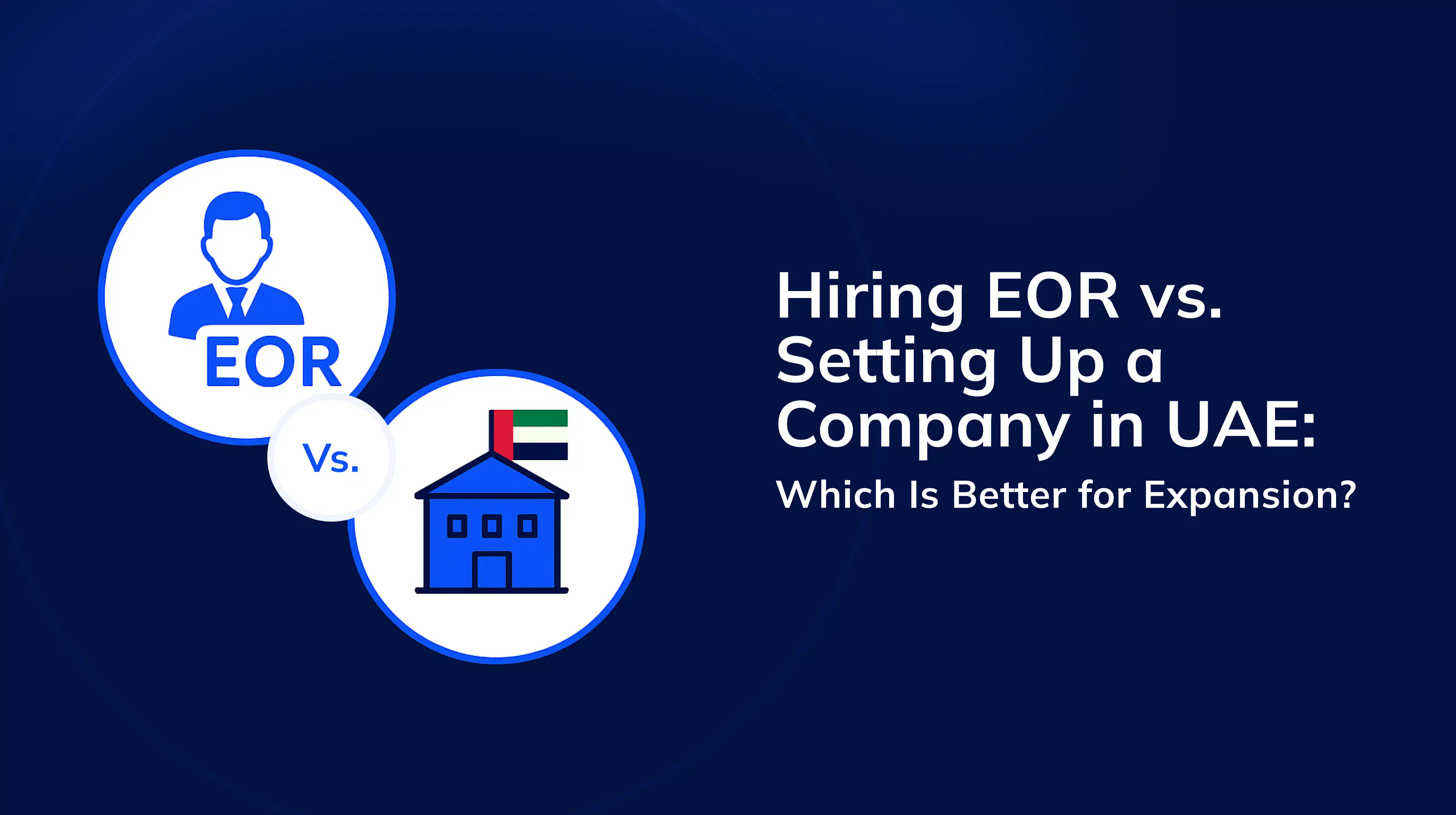



.svg)
























_EasiestToDoBusinessWith_EaseOfDoingBusinessWith%20(1).svg)





.svg)












